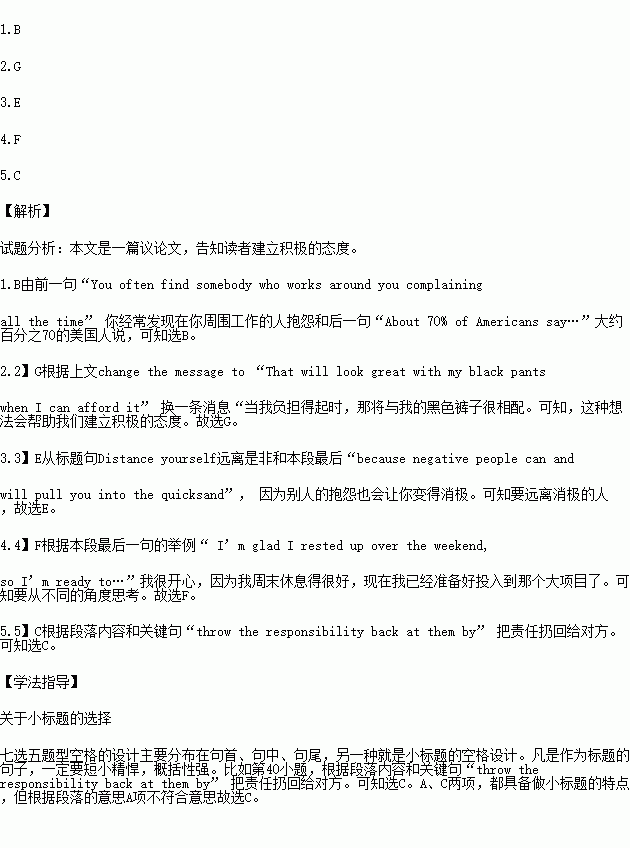题目内容
根据短文内容,从短文后的选项中选出能填入空白处的最佳选项。选项中有两项为多余选项。
You often find somebody who works around you complaining all the time, don’t you? 1. About 70% of Americans say being around nonstop complainers sometimes has a bad influence on them. Luckily, here are 4 tips to help form positive patterns.
1. Form self-awareness
When a negative thought pops into your mind, immediately correct it. Instead of telling yourself “That’s a nice shirt, but I can’t afford it,” change the message to “That will look great with my black pants when I can afford it.” 2.
2. Distance yourself
3. Excuse yourself and go somewhere quiet, somewhere outdoors in the fresh air. Think of something pleasant before returning. You have to take this seriously because negative people can and will pull you into the quicksand(困境).
3. Don’t try to change complainers
If you find yourself trapped in a group of complainers in a meeting or at a social event, simply choose silence. Let their words bounce off you while you think of something else. Attempting to stop the complaining can make you a target. 4. If someone says, “I hate Mondays, weekends are too short,” try to think, “I’m glad I rested up over the weekend, so I’m ready to make some improvement on that big project.”
4. 5.
When someone is shouting at you angrily, throw the responsibility back at them by asking, “So what do you intend to do about it?” In most cases, complainers don’t really want a solution. They just want to speak them out. If you make them aware that they themselves have to find the solutions, they will leave you alone and find someone else to complain to. If so, you will be happy.
A. Find solutions
B. You are not alone in this case.
C. Change responsibility
D. You will never know what they are going to talk about.
E. Whenever possible, escape from negative conversations.
F. But you can redirect the discussion in your own mind.
G. By doing this, it will lead to positive behaviors.
 备战中考寒假系列答案
备战中考寒假系列答案第一节 基础写作(共1小题,满分15分)
以下为你所了解的环保信息及你的建议。请根据此信息写一篇英语短文, 给你校的英语校报投稿。
写作内容:
现状 各大城市污染严重、空气质量越越差。 原因 汽车、工厂排放毒气; 森林遭到砍伐。 后果 人体吸入有害物质, 导致肺癌等疾病, 损害健康。 建议 控制汽车数量; 禁止工厂排污; 外出步行、多乘公交车。 |
写作要求:
1. 只能使用5个句子表达全部内容; 2. 作文中不能出现真实姓名和学校名称。


